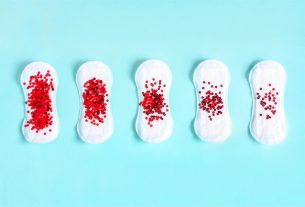Postpartum menstruation can change and take some time to normalize, which can vary from one woman to another.
Menstruation consists of the desquamation of the internal walls of the uterus when fertilization is not carried out. In other words, the female body prepares for pregnancy, and when it does not occur, the inner membrane of the uterus, the endometrium, becomes detached. Therefore, it causes bleeding, which is part of the female reproductive cycle that occurs every month. Therefore, normally during pregnancy there are no periods. However, there is a doubt about when postpartum menstruation occurs.
Initially, postpartum menstruation varies depending on the presence or lack of breastfeeding. That is, if the mother is breastfeeding, there are spikes in the hormone prolactin, which inhibits ovulation. Consequently, it affects the menstrual cycle, with light bleeding or no bleeding.
Therefore, it is common for women not to menstruate postpartum, or to have light spotting for several weeks. On the other hand, other bleeding, called lochiation, may also occur. In short, it consists of the period in which the body carries out the healing process of the uterus, causing intense bleeding.
Lochiation: Heavy postpartum bleeding

After childbirth occurs, the female body begins a process of healing the uterus. Furthermore, with this process there is intense bleeding, which is not characterized as menstruation. In short, menstruation consists of the desquamation of the endometrium due to the absence of fertilization.
While lochiation is based on the contraction of the uterus as a result of placental abruption. Generally, these bleeds last around 40 to 45 days, which is the time it takes for the uterus to heal. Furthermore, its reddish color is very intense at first.
How long after giving birth do you get your period?

Postpartum menstruation has a direct influence on each woman’s breastfeeding period. One of the main inhibitors of postpartum menstruation is breastfeeding. Since, it influences the production of the hormone called prolactin, responsible for milk production.
In short, this hormone ends up inhibiting ovulation and causing a delay in menstruation. Therefore, when the breastfeeding process begins to decrease, prolactin decreases, and ovulation gradually returns to normal.
On the other hand, some women do not breastfeed, so menstruation tends to return between 1 and 3 months after giving birth. Therefore, the longer you breastfeed, the further away your first postpartum period will be.
And, as soon as you reduce breastfeeding, your body will ovulate again. However, hormone levels can vary between women, and diet can also influence them.
Finally, it is important to highlight that after giving birth, women should avoid having sexual intercourse for the first 40 days, a period called quarantine. Well, the uterus is in the process of recovery. Therefore, having sexual intercourse during this period can increase the risk of infection.
Common changes in postpartum menstruation

Furthermore, postpartum menstruation may undergo some changes. At first, it is normal for the menstrual cycle to be irregular. That is, having different flows for about 2 to 3 months.
However, after this period it tends to stabilize again. But, if it does not resolve, consult a gynecologist to analyze your case and recommend appropriate solutions. However, the first ovulation after giving birth is unpredictable.
Therefore, the woman must adopt some contraceptive method, even during the breastfeeding period. And, it must be a contraceptive recommended by her gynecologist, to avoid hormonal changes that could harm her health.
On the other hand, the regularity of the menstrual cycle is also influenced by the use of contraceptives. Therefore, if a woman breastfeeds for 6 weeks after giving birth and takes contraceptives, it will influence the amount of milk produced.
Therefore, the milk will decrease, and it will also have lower quality. And, if a woman chooses not to breastfeed, she can take contraceptives immediately after giving birth. For example, the normal contraceptive, or 48 hours after birth, the IUD, which will help regulate the menstrual cycle.
Finally, coloring can also be affected during postpartum menstruation. In short, it can be redder or browner.
Are there any differences between normal postpartum menstruation and cesarean section?

Some women wonder whether postpartum menstruation is influenced by the type of birth performed, whether natural or cesarean. However, there are no differences in childbirth, as they do not influence the date when menstruation will begin. Therefore, the only thing that will directly influence postpartum menstruation is breastfeeding.
Is it possible to get pregnant while on guard?

Yes, it is possible to get pregnant before menstruating again. Furthermore, the safest period for pregnancy not to occur is between the first 2 months after giving birth. Furthermore, after 40 days, contraceptive use must be started. Therefore, the most recommended pill for postpartum is progesterone-based. Because they are weaker and protect against a possible unwanted pregnancy.
However, women who do not breastfeed have their ovulatory cycles normalized more quickly. This way, postpartum menstruation can return more quickly. Consequently there are greater chances of getting pregnant.
What is libido like postpartum?

Due to the actions of hormones during and after childbirth, there are cases in which libido disappears. However, there are treatments for these situations. Therefore, seek medical help, who will evaluate your case and recommend appropriate medications to balance hormones.
On the other hand, some women greatly increase their desire to have sexual intercourse after giving birth. However, the first few sexual encounters may be accompanied by vaginal dryness, which can cause discomfort. Because, hormonal changes influence lubrication.
Therefore, investing in lubricating gels contributes to vaginal moisture and increases pleasure. For example, the FamiGel gel is made from water, helping to control vaginal pH.
So, if you liked this article, find out more about the subject in: Symptoms of postpartum depression – What are the most common and what to do?

Sign up for our newsletter and stay up to date with exclusive news
that can transform your routine!
Warning: Undefined array key "title" in /home/storelat/public_html/wp-content/plugins/link-whisper-premium/templates/frontend/related-posts.php on line 12
Warning: Undefined array key "title_tag" in /home/storelat/public_html/wp-content/plugins/link-whisper-premium/templates/frontend/related-posts.php on line 13




